Submitted by Jonathan on 17 August 2005 - 4:44pm
 This is totally whacky... yet curiously, this website is the beginning of a new television series on BBC2
This is totally whacky... yet curiously, this website is the beginning of a new television series on BBC2
Kind Danny I, is looking for new citizens to join his newly formed country, so new, that it hasn't a name yet, though it does sport its own national anthem (which is very amusing!), with dance moves (!) and a national flag. Cool huh? this guy is off his head, but I admire him for what he's achieved so far. Some 23,117 citizens as of this moment.
So, what are you waiting for, Become a citizen, today and tune in next week for the launch Citizen TV!
Submitted by Jonathan on 7 August 2005 - 11:24pm
I have spent some time installing and developing a web interface to UltraSMS. UltraSMS is a little application that reads SMS (txt) messages from mobile phones and stores them in a MySQL database. It runs on Mac OS X or Linux and interfaces with several phones using Bluetooth or a serial cable connection. Tim Ellis of Ultralab developed this software, well worth a look.
This application has been used several times, most widely known for its use in Pirate BBC Essex, a local radio station celebrating 40 years of Pirate radio.
You can experiment with this tool by sending messages to my blog entry by txting anything you like to 0044 7811 636 738 You should see the entries appear, almost instantly, in the sidebar to the right. Remember to hit refresh first!
Please don't worry, your number isn't displayed anywhere on this website and before you ask, it costs the same as it would to txt anyone else, there are no hidden charges!
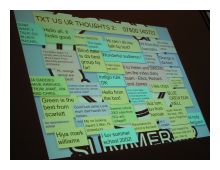 The neat thing about the UltraSMS application is that it is very cheap to get going... all you need is a mobile phone with a SIM card, preferably Bluetooth enabled since then you don't have to worry about cables and connections, and a Linux / Macintosh computer. That's it!
The neat thing about the UltraSMS application is that it is very cheap to get going... all you need is a mobile phone with a SIM card, preferably Bluetooth enabled since then you don't have to worry about cables and connections, and a Linux / Macintosh computer. That's it!
I have used the application when speaking at conferences - useful for collecting people's contributions and for the audience to post their questions as I'm speaking. Simple but effective. Though this is a photograph of a SummerSchool presentation event, you can see how people's contributions are added as 'stickies'. This 'stickies' user interface was developed by another member of the Ultralab team, Alex Blanc, using Flash.
Submitted by Jonathan on 6 August 2005 - 12:02pm
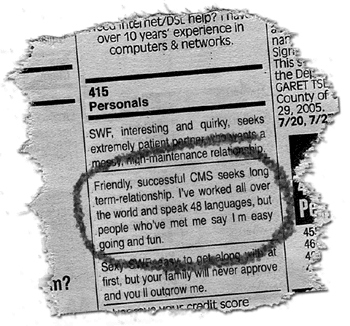 I'm really excited having just managed to download and install Plone 2.1 rc1 (release candidate 1) and all this after a long day yesterday with Richard Millwood and Matthew Eaves, working together on the new Ultralab website...
I'm really excited having just managed to download and install Plone 2.1 rc1 (release candidate 1) and all this after a long day yesterday with Richard Millwood and Matthew Eaves, working together on the new Ultralab website...
Plone is a content management system (CMS) or framework (CMF) as it is termed by the people at Plone. Essentially, Plone allows you to build complex websites where the data or content is stored within a database. This helps to organise your data or represent it in whichever way you please. Plone is particularly strong on building a sense of community, with a sound notion of Users and Groups and Privileges system, and is one of the defining factors why we are building the next Ultralab website and Ultraversity Portfolio/Community spaces using this tool.
Over the past 2 months, there has been an enormous learning curve to master - and we aren't there yet, but with each challenge, we seem to learn something new. Some things are still a mystery... like getting the FeedParser (RSS) to function from within ContentPanels (a Plone product) One of the most significant struggles is learning a new programming language, Python. Luckily, it is said that Python was a language developed to help people learn about programming. Shouldn't too hard then if you don't mind all the dots. Python.is.a.dot.programming.language !
So far we have been developing on Plone 2.0.5 and with Plone 2.1 (set for release on August 1st, now August 15th) - just around the corner, our recent concern has been, 'Will our development effort be wasted or lost during the upgrade process?' Currently, the latest version doesn't have a 'package installer' application and relies on downloading the binaries for install using commands such as
./configure; make; make install
Also, I've learnt about Subversion (a software application to manage version control) Thanks to Chris Davis, I've managed to make sense of the download and installation of Subversion. Thanks Chris. The web is just so handy for finding and learning new things.
This has led to me installing Zope 2.8.0, upgrading my version of Python to 2.3.5, installing Darwin Ports (whatever these are!) and using Subversion to download and install Plone 2.1 rc1
Now all I need to do is find out what happens to our development work when we import the site into the new version of Plone.
see also:
Submitted by Jonathan on 1 August 2005 - 8:07am
 Stepping Stones and the National Hemiplegia Organisation have recently purchased an old London Routemaster RM bus from http://www.ensignbus.co.uk/
Stepping Stones and the National Hemiplegia Organisation have recently purchased an old London Routemaster RM bus from http://www.ensignbus.co.uk/
The intention here, rather like the Computer Bus on the Isle of Man, is to provide more opportunities for children to become involved in digital creativity projects, using video, animation, graphic design applications.
So far the bodywork has been re-sprayed, and work to the inside of the bus is set to be carried out anytime soon. The most pressing need right now is to brainstorm the layout for the inside of the bus. It will need to accommodate working spaces for children using computers, which are likely to be portable Apple iBook computers. The bus must also ensure that wheelchair users can access at least the lower deck and this means that the upper deck can't have an exclusive facilities or technology which isn't accessible from anywhere else.
So your thoughts please, we have a double decker bus to design and construct. This is an exciting opportunity and we want to get it right.
Submitted by Jonathan on 18 July 2005 - 3:12pm
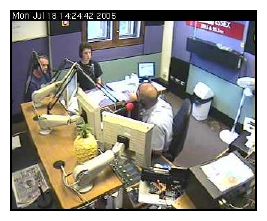 I have just returned from the BBC Essex Studio. If you are interested in what Matt and I had to say live on air with listeners talking about computer start-up issues, copying music from vinyl to computer and troubleshooting a computer which doesn't hold the graphics card setting, then download and listen (4.2MB) to the audio recording. (This is a heavily compressed .3gp file, you'll need QuickTime for it to play. To download, right click or ctrl click the link)
I have just returned from the BBC Essex Studio. If you are interested in what Matt and I had to say live on air with listeners talking about computer start-up issues, copying music from vinyl to computer and troubleshooting a computer which doesn't hold the graphics card setting, then download and listen (4.2MB) to the audio recording. (This is a heavily compressed .3gp file, you'll need QuickTime for it to play. To download, right click or ctrl click the link)

sound_advice.mp4 (4.2MB)
There were some quite tricky questions (!) from the listeners, and towards the end, the phone lines were heaving with callers wanting to ask their questions, pity the programme ran for just the hour!
Submitted by Jonathan on 18 July 2005 - 11:14am
Submitted by Jonathan on 18 July 2005 - 7:42am
Submitted by Jonathan on 15 July 2005 - 5:13pm
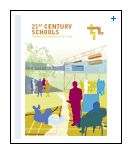 I attended another school design meeting today at Warwick School for Boys in Walthamstow. I presented some of our CABE research and showed them some of our case study schools... this stimulated a good discussion about what some of the issues are regarding the design of a new school.
I attended another school design meeting today at Warwick School for Boys in Walthamstow. I presented some of our CABE research and showed them some of our case study schools... this stimulated a good discussion about what some of the issues are regarding the design of a new school.
Our discussion broadly covered these issues...
- Future technology.... mobile phones, portable computers, smart cards, PDAs
- Curriculum design.... teacher-led, personalised learning, workplace learning, university studies
- Building design.... classroom size, utilisation, ownership, corridors, toilets
What was clear that these couldn't be discussed in isolation since the learning spaces can depend on the organisation of the curriculum, and both the design of the building, curriculum and technology
Again, involving stakeholders in the design of the school is well understood. In fact, the Head and her team understood lots about school design having been involved in this process for some months now. She was keen that I should meet the children who are on the school design panel (this is in addition to the School Council.)
One thing is clear, we need to plan for the certainty of uncertainty. This requires us to be creative about building flexibility into the design of future schools and how both the curriculum and technology is implemented.
Submitted by Jonathan on 9 July 2005 - 6:42pm
I arrive home to find a spam comment, grrrr! How could this be... yet I've installed Captcha (see Comment Spam article)
I guess some spam engine has managed to screen read, interpret the characters in the Captcha box and submit the form...grrrr
The lengths these spam engines go to.... surely there are easier sites to leave spam on.... why mine? Not that computers have 'intelligence' to understand one site is easier than another...
 What do I do next? Perhaps make the image harder for a computer to read? Add a textured background? Add more characters? Change the font? Maybe use a picture of a house instead and ask users to type the name of the image they see? Thoughts?
What do I do next? Perhaps make the image harder for a computer to read? Add a textured background? Add more characters? Change the font? Maybe use a picture of a house instead and ask users to type the name of the image they see? Thoughts?
You do have to see the funny side however...
Submitted by Jonathan on 7 July 2005 - 11:45pm
 I'd almost forgotten that I'd produced such a resource. Occasionally I find myself looking through server log files, seeing what kind of things people find on my faithful server, Barney Rubble.
I'd almost forgotten that I'd produced such a resource. Occasionally I find myself looking through server log files, seeing what kind of things people find on my faithful server, Barney Rubble.
One of the most popular resources, though it's a bit dated now is 'Creating a Learning Environment' which I produced as a keen and enhusiastic young teacher in preparation to present to a room of prospective NQT's.
It was an interesting step-back to revisit my classroom as it was then (December 2000), and recall some things that were very significant at the time.
Beware, colours used on those pages were a bit ghastly.... some things never change.
Submitted by Jonathan on 3 July 2005 - 7:05pm
Notes on how to apply Apache / Plone rewrite rule to allow Plone to serve using a non standard port to a standard port (80)
... the sort of thing you do once in a blue moon.
Submitted by Jonathan on 3 July 2005 - 5:59pm
To implement a rewrite rule that allows a Plone site running on a non-standard port (8200, 8400 etc) to be accessible through port 80. Uses Apache.
- Register the domain name to point at the machine
- Install Virtual Host Monster (VHM) in Plone instance
Submitted by Jonathan on 3 July 2005 - 5:28pm
Submitted by Jonathan on 2 July 2005 - 1:14pm
Submitted by Jonathan on 20 June 2005 - 10:25pm
 Had a fantastic weekend - thanks team - sailing on Cracker for the Round the Island Race at Cowes (Isle of Wight.) Cracker is an Oyster 37 ft yacht.
Had a fantastic weekend - thanks team - sailing on Cracker for the Round the Island Race at Cowes (Isle of Wight.) Cracker is an Oyster 37 ft yacht.
See my collection of photographs from the event. It was an early start... leaving the pontoon at about 6:20am and heading for the waiting area so that we could watch big boats like B&Q and Ellen MacArthur leave the start line. As it was, there was a postponed start, but luckily this was only by an hour.
We worked well together, learnt lots and had good fun. I was quite honoured to be on the Cracker team given that other Cracker team members had arrived for this race. The team consisted of... Stephen (helm), Carole (navigation), Katie (main sheet), Rick (pit). Tim (jib/genoa sheet), Gordon (jib/genoa sheet), Toby (spinnaker sheet), Melissa (bow), Bex (mast), Jonathan (foredeck) - I found the Mad Hatters guide which usefully explains these roles.
New role for me working on foredeck, planting the jib and assisting the winchers/grinders to pull in the jib during tacks and gybes. Provided me with a great opportunity to observe other roles and understand race tactics.
Submitted by Jonathan on 16 June 2005 - 3:46pm
Just found a Google Page rank extension for Firefox. It's an easy extension to install - just click the link to install in a Firefox browser. You might have to tell Firefox that it's okay to allow this to be installed (security feature which you'd rather have than didn't)
With the advent of (Tiger's) Dashboard widgets, I've chosen not to install Konfabulator and the Page Rank Widget... I figured that one set of Widgets is enough for anyone... plus the floating panel was either always hidden behind browser windows or on top getting in the way!
Read more about Google Page Rank. Stephen Powell refers to it as a measure of Google Juice...
Submitted by Jonathan on 15 June 2005 - 5:11pm
Stephen Powell and I had a rather enlightening conversation about future portfolio tools for Ultraversity. Many of you will know that Ultralab's efforts in recent months have been to somehow work our way through the muddy waters of open source, proprietary and custom built (in-house) software.
Our discussion was another chance to think outside the box - breakaway from the mould which we have created in the form of the current Portfolio Tool and see if we had the chance to do it all over again, what would we do next time. Technology has moved on, in the way of blog technology, rss, open source, podcast, single sign on.
Our conversation helped us to realign our belief that the portfolio tool (in whatever guise) is about the learner, the researcher. The artefacts should be within the control of the learner who then chooses which artefacts to present for assessment.
We also talked about the need for a commenting 'engine' - the ability for whoever to comment on everything and anything - with a users & groups permission set.
Submitted by Jonathan on 14 June 2005 - 7:14am
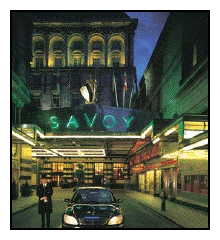 Last night I was fortunate to attend the Royal Television Society awards ceremony at The Savoy in London as a member of the Primary and Secondary Multimedia and Interactive Jury. This years' guest speaker was Prof. Ted Wragg of Exeter University who spoke of the necessity for teachers to bring creativity and innovation to the classroom. He spoke of children being 'switched on' to learning with the metaphorical switch and in the same way, 'switched off' too.
Last night I was fortunate to attend the Royal Television Society awards ceremony at The Savoy in London as a member of the Primary and Secondary Multimedia and Interactive Jury. This years' guest speaker was Prof. Ted Wragg of Exeter University who spoke of the necessity for teachers to bring creativity and innovation to the classroom. He spoke of children being 'switched on' to learning with the metaphorical switch and in the same way, 'switched off' too.
Ted cited an example where he observed one student teacher conducting a lesson about optics - during the opening introduction, Ted observed the children slipped into comatose-d state - that is until, as if from nowhere, he presented them with a pinhole camera. At which point, the children became visibly excited and ecstatic. The response by the teacher... "Okay, calm down, calm down... there's nothing to get excited about here"
Ted continued by explaining young children are naturally inquisitive, and despite not yet understanding the scientific terms to explain something, naturally observe, question and explain. They are what you might say naturally 'switched on'. As teachers, we therefore only need to provide an environment which allows pupils to fulfill this desire for learning and Ted Wragg suggested that we achieve this by being creative and innovative teachers. As Stephen Heppell writes in the Education Guardian, following a dialogue with some of the world's most innovative teachers...
"Everyone was doing exceptional work despite, rather than thanks to, their various national curriculums. They all shared similar tales of "too much stuff", too tight targets, no space to innovate, and of a rampant managerialism that seemed to be crushing the creativity out of all but a few. It was as though the innovations driven forward by ICT had frightened the life out of their various policy-makers with a resulting mess of regulation and prescription to keep the lid on progress"
There is real desire by teachers to be everything that Ted Wragg evangelises about but we need to change the culture which pushes against this.
Frank Flynn of the BBC was awarded the Royal Television Society Judge's Award for his long-standing contribution to Educational Television. He continues to be a key player in the Digital Curriculum initiative and following Ted's speech, was rather fitting that he should be recognised in this way.
Congratulations also to the L8R (pronounced 'later") team who certainly knew how to acknowledge the winning of the Multimedia and Interactive award.
Submitted by Jonathan on 11 June 2005 - 11:11am
Submitted by Jonathan on 25 May 2005 - 8:38am
Submitted by Jonathan on 24 May 2005 - 4:15pm
Submitted by Jonathan on 23 May 2005 - 9:12pm
Submitted by Jonathan on 21 May 2005 - 11:23am
Submitted by Jonathan on 6 May 2005 - 10:40pm
Submitted by Jonathan on 20 April 2005 - 7:51pm
Pages